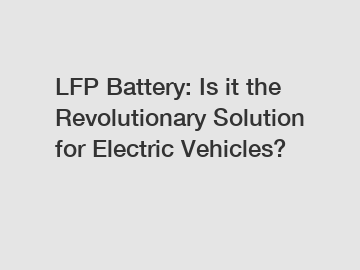LFP Battery: Is it the Revolutionary Solution for Electric Vehicles?
LFP Battery: Is it the Revolutionary Solution for Electric Vehicles?
As the demand for electric vehicles (EVs) continues to grow, so does the need for advanced and efficient battery technology. Manufacturers are constantly striving to develop batteries that offer longer range, faster charging times, and improved safety. One solution that has gained significant attention in recent years is the Lithium Iron Phosphate (LFP) battery. With its unique characteristics, the LFP battery has emerged as a promising choice for EVs. In this article, we will explore the potential of LFP batteries and whether they can truly revolutionize the EV industry.
Advantages of LFP Battery:

1. Long Cycle Life:
LFP batteries are known for their impressive cycle life, meaning they can endure a high number of charge-discharge cycles without significant degradation. Compared to other lithium-ion batteries, LFP batteries can withstand up to 2,000 to 3,000 cycles, making them ideal for long-term use in electric vehicles. With a longer lifespan, LFP batteries can reduce the overall cost of ownership for EV owners, as they may not need to be replaced as frequently.
2. Enhanced Safety:
Safety is a critical concern when it comes to batteries. LFP batteries have a stable chemical structure, making them less prone to thermal runaway or combustion. They are more resistant to overcharging and overheating, ensuring a reduced risk of accidents or fires. This inherent safety advantage makes LFP batteries an attractive choice for electric vehicle manufacturers, giving users peace of mind while on the road.
3. Wide Operating Temperature Range:
Extreme temperatures can significantly impact the performance and lifespan of batteries. However, LFP batteries can operate efficiently in a wide range of temperatures, from -20°C to 60°C. This characteristic makes them suitable for various weather conditions, ensuring consistent performance regardless of the climate. EVs equipped with LFP batteries can be relied upon even in the harshest of environmental conditions.
Limitations and Challenges:
While LFP batteries offer significant advantages, they also have some limitations and challenges to overcome before they can become the dominant technology in the EV industry.
1. Lower Energy Density:
Compared to other lithium-ion batteries, LFP batteries have lower energy density. This means they have a lower storage capacity, resulting in a shorter driving range for electric vehicles. However, ongoing advancements in battery technology are continuously improving the energy density of LFP batteries, mitigating this limitation over time.
2. Slower Charging Speed:
LFP batteries typically have slower charging speeds compared to some other lithium-ion batteries on the market. For EV owners looking for a quick charging experience, this can be a drawback. However, efforts are underway to develop faster-charging LFP batteries, effectively addressing this challenge.
Conclusion:
LFP batteries possess several key advantages that make them an attractive option for electric vehicles. With their long cycle life, enhanced safety features, and wide operating temperature range, they have the potential to revolutionize the EV industry. While limitations such as lower energy density and slower charging speeds exist, ongoing research and development are expected to further enhance the capabilities of LFP batteries. As the EV market continues to grow, it is crucial for manufacturers and researchers to explore all possible avenues to meet the demand for better battery technology.
If you are interested in learning more about LFP batteries or want to explore electric vehicles powered by this revolutionary solution, please do not hesitate to contact us.
(Contact us: [insert contact information]).
For more 36v forklift battery for sale, lithium iron phosphate cell price, prismatic cell lifepo4information, please contact us. We will provide professional answers.


